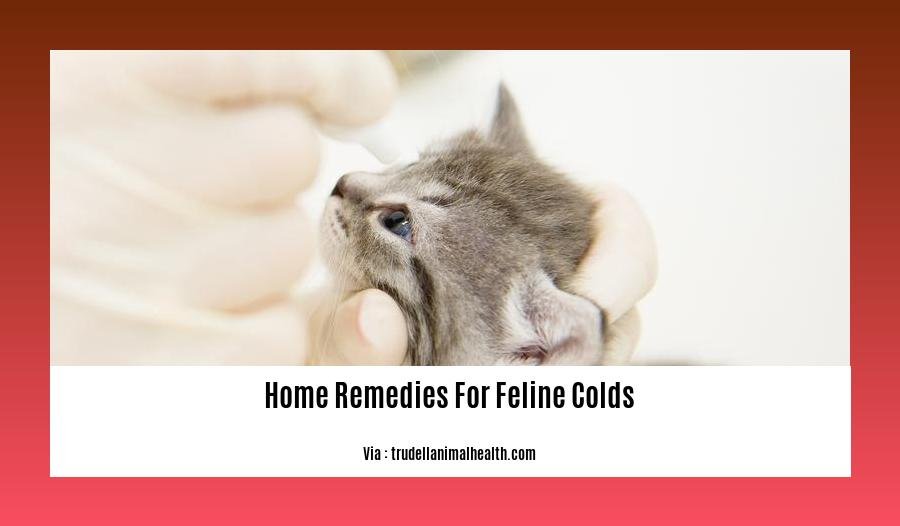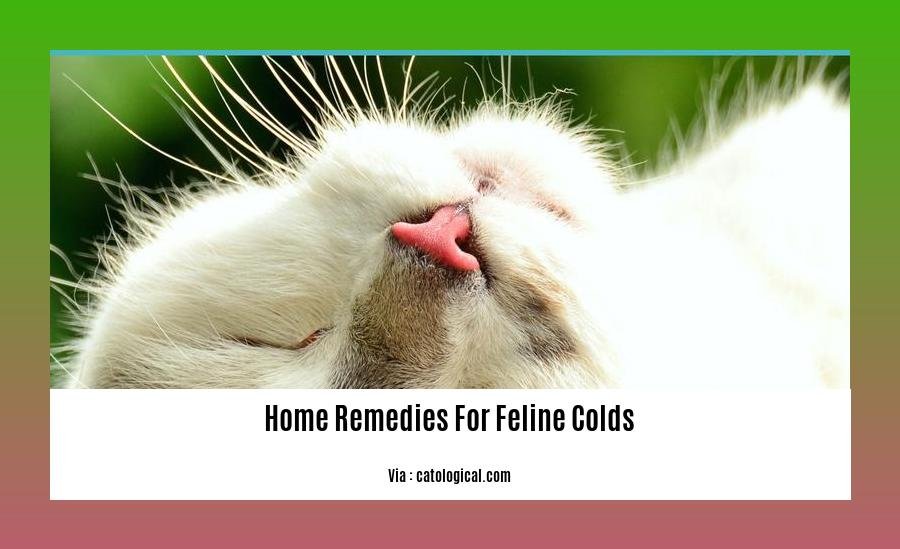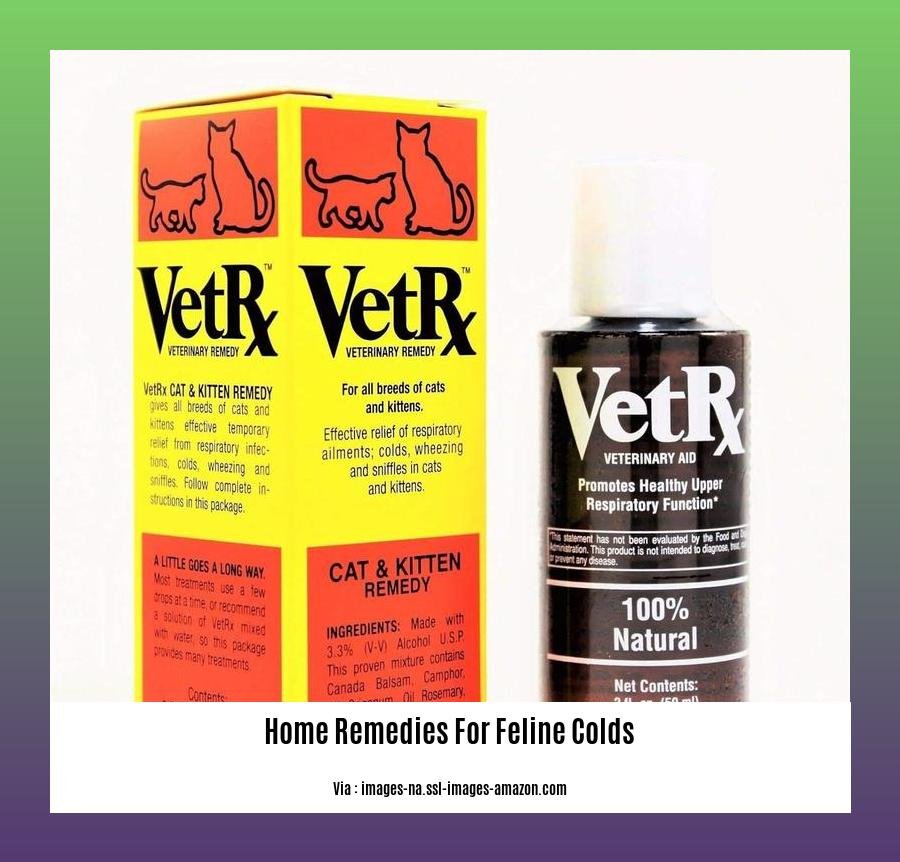Dive into the world of home remedies in [Home Remedies for Feline Colds: Natural Relief for Your Cat’s Discomfort]. Discover holistic approaches to alleviate cold symptoms in your feline friend. Learn effective techniques, natural ingredients, and potential side effects. Empower yourself with knowledge to provide comfort and care during kitty colds.
Key Takeaways:
- Steam Therapy:
-
Use a steamy room or humidifier to ease congestion.
-
Clean Eyes and Nose:
-
Gently wipe away discharge with a cotton ball soaked in warm water.
-
Grooming and Hydration:
-
Keep your cat well-groomed and ensure it’s hydrated.
-
Vitamin C, Apple Cider Vinegar, and Lysine:
-
Consider supplements to boost immunity.
-
Warmth and Stress Reduction:
-
Keep your cat warm and reduce stress.
-
Consult a Veterinarian:
- Seek professional help if symptoms are severe or persistent.
Home Remedies for Feline Colds: Soothe Your Cat’s Discomfort Naturally

As a compassionate fur-parent, witnessing your feline friend suffering from a cold can be heartbreaking. While it’s crucial to seek veterinary care if symptoms persist or worsen, there are several home remedies for feline colds that can offer natural relief and comfort to your cat. Let’s explore some gentle and effective methods to help your kitty feel better.
Steam Therapy: A Natural Decongestant
Just like humans, cats can benefit from the soothing properties of steam to relieve nasal and respiratory congestion. Here’s how you can provide steam therapy for your cat:
- Prepare a steamy haven: Fill a large pot or sink with steaming water. Ensure the water is not too hot to avoid scalding your cat.
- Create a cat-friendly steam room: Place your cat in a carrier or a closed bathroom with the steamy water. Make sure your cat has a comfortable spot to rest and can easily exit if overwhelmed.
- Let the steam work its magic: Allow your cat to inhale the steam for 10-15 minutes. The steam will help loosen mucus and ease breathing.
Cleanse Those Eyes and Nose: Gentle Care for Your Cat’s Comfort
Discharge from the eyes and nose can irritate your cat and worsen their cold symptoms. Here’s how to provide gentle cleansing:
- Prepare a cleaning solution: Mix warm water with a pinch of salt or a cat-friendly tear-free saline solution.
- Gently wipe away discharge: Use a soft, clean cotton ball or gauze pad soaked in the cleaning solution to gently wipe away discharge from your cat’s eyes and nose. Be careful not to rub or apply pressure.
- Repeat as needed: Clean your cat’s eyes and nose several times a day, especially if discharge accumulates.
Grooming and Hydration: Essential Pillars of Cat Comfort
Maintaining good hygiene and hydration is vital for your cat’s overall health and well-being, especially during illness. Here’s how to ensure your cat is well-groomed and hydrated:
- Groom regularly: Brush your cat’s fur gently to remove loose hair, dirt, and dander. This helps prevent matting, which can trap bacteria and worsen cold symptoms.
- Ensure adequate hydration: Provide fresh, clean water at all times. You can also offer your cat bone broth or electrolyte-rich fluids to encourage hydration.
Vitamin C, Apple Cider Vinegar, and Lysine: Boosting Immunity Naturally
Certain supplements can help boost your cat’s immune system and aid in recovery from a cold. Here’s how to use these natural remedies safely and effectively:
- Vitamin C: Offer your cat a small amount of vitamin C supplement (250-500 mg) once or twice a day. Vitamin C is an antioxidant that supports the immune system.
- Apple Cider Vinegar: Dilute a small amount of apple cider vinegar (1 teaspoon per 8 ounces of water) and offer it to your cat. Apple cider vinegar has antimicrobial and immune-boosting properties.
- Lysine: Provide your cat with a lysine supplement (500-1000 mg) twice a day. Lysine is an amino acid that can help prevent the replication of the herpesvirus, a common cause of feline colds.
Warmth and Stress Reduction: Comforting Your Cat During Illness
Creating a comfortable and stress-free environment can aid your cat’s recovery. Here’s how to provide warmth and reduce stress:
- Warm and cozy bedding: Ensure your cat has access to a warm, comfortable bed or resting spot. You can also use a heating pad set to low heat.
- Reduce stress factors: Identify and minimize stressors in your cat’s environment. This could include loud noises, new people or animals, or changes in routine.
When to Consult a Veterinarian: Seeking Professional Guidance
While home remedies for feline colds can provide relief, it’s essential to consult a veterinarian in certain situations:
- Severe or persistent symptoms: If your cat’s symptoms are severe, such as difficulty breathing, lethargy, or loss of appetite, seek veterinary attention immediately.
- Underlying health conditions: If your cat has underlying health conditions, such as respiratory problems or a compromised immune system, consult your veterinarian before administering home remedies.
- Lack of improvement: If your cat’s symptoms do not improve after a few days of home treatment, seek veterinary advice.
By providing gentle care and implementing home remedies for feline colds, you can help alleviate your cat’s discomfort and aid in their recovery. Remember to observe your cat’s condition closely and seek veterinary guidance when necessary.
Explore the natural remedies that can help alleviate your dog’s uncomfortable skin issues. Click on home remedies for dog skin allergies itching to discover effective solutions for your furry friend’s skin allergies and itching.
For a natural approach to treating canine skin infections, discover the effective home remedies for dog skin infection. Soothe your dog’s irritated skin and promote healing with natural ingredients.
Restore your dog’s healthy and radiant coat with home remedies for dog skin rash. Find natural solutions to calm inflammation, reduce itching, and promote skin regeneration.
Restore your thick and lustrous hair after pregnancy with home remedies for hair fall after pregnancy. Explore natural remedies for hair restoration and regain your confidence.
Natural Ingredients for Effective Home Remedies

Suffering from a cat cold can be stressful for your feline friend and frustrating for you as a pet owner. Natural ingredients for effective home remedies can ease symptoms and aid healing without resorting to chemical medications.
Key Takeaways:
- Natural remedies can alleviate feline cold symptoms like nasal congestion, sneezing, and fever.
- Dietary supplements such as Vitamin C, L-Lysine, and Apple cider vinegar boost the immune system and help fight off infection.
- Herbal remedies like Eupatorium perfoliatum, Sambucus nigra, and Mullein Leaf provide respiratory support and soothe coughs.
- Stress reduction and proper nourishment support a cat’s immune system and aid recovery.
- Consult a veterinarian if symptoms persist, worsen, or underlying health issues exist.
Dietary and Herbal Remedies
Dietary supplements and herbal remedies can provide a natural boost to your cat’s immune system and help alleviate cold symptoms:
- Dietary Supplements:
- Vitamin C: Offer 500 mg daily when healthy, and increase to 1000 mg twice daily when sick, to support immunity.
- L-Lysine: Give 500 mg daily when healthy, and increase to 1000 mg twice daily when sick, to inhibit virus replication.
-
Apple Cider Vinegar: Mix ½ tablespoon daily with food or tuna juice for its antimicrobial and immune-boosting properties.
-
Herbal Remedies:
- Eupatorium perfoliatum: This herb helps relieve symptoms of common colds, including nasal congestion, sneezing, and fever.
- Sambucus nigra: Traditionally used for respiratory illnesses, this herb helps relieve coughing and congestion.
- Mullein Leaf: Soothes symptoms of asthma and kennel cough, and helps expel mucus from the airways.
Other Natural Remedies
Beyond supplements and herbal remedies, other natural approaches can aid your cat’s recovery:
- Steam Therapy: Create a steamy environment in a carrier or bathroom to help loosen mucus and ease breathing.
- Cleanse Eyes and Nose: Use a warm water and salt solution or cat-friendly saline solution to gently wipe away discharge from eyes and nose.
- Grooming and Hydration: Brush your cat’s fur regularly, and provide fresh, clean water and electrolyte-rich fluids to support hydration.
- Warmth and Stress Reduction: Provide a warm and comfortable bed, use a heating pad set to low heat, and identify and minimize stressors in your cat’s environment.
When to Consult a Veterinarian
While natural remedies can provide relief, it’s essential to seek veterinary attention if symptoms are severe or persistent. Consult your veterinarian before administering home remedies if your cat has underlying health conditions. If there’s no improvement after a few days of home treatment, veterinary advice is recommended.
Citations:
Natural Home Remedies for Cat Colds
Effective Home Remedies for Cats with Colds
Potential side effects of using home remedies and when to consult a veterinarian
Hey there, cat lovers! We’re diving into the realm of home remedies for feline colds. These natural remedies can provide relief, but we need to be mindful of possible side effects and know when to seek veterinary help.
Key Takeaways:
- Natural remedies can be a helpful option, but always consult your vet before administering anything to your cat.
- Some home remedies may have potential side effects, such as digestive upset or allergic reactions.
- Monitor your cat closely for any signs of adverse reactions and stop using the remedy if you notice anything unusual.
- If your cat’s symptoms are severe, persistent, or don’t improve within a few days using home remedies, always consult a veterinarian.
When it comes to potential side effects, it’s crucial to be aware of the ingredients used in home remedies. For instance, garlic is a common ingredient in some cold remedies, but it can be toxic to cats in large quantities.
Another point to consider is that some remedies may interact with medications your cat is taking. Always discuss any home remedies with your vet to ensure they don’t interfere with prescribed treatments.
Now, let’s talk about when you should consult a veterinarian. If your cat’s cold symptoms are severe, such as high fever, difficulty breathing, or refusal to eat, seek professional help immediately. Additionally, if home remedies don’t seem to be helping or your cat’s condition worsens, it’s time to call the vet.
Remember, while home remedies can be useful, they’re not a substitute for veterinary care. If you’re unsure about using a particular remedy or if your cat’s symptoms persist, don’t hesitate to consult your trusted veterinarian.
Citations:
[1] Trudell Animal Health:
[2] My Animals:
Step-by-Step Guide to Administering Home Remedies for Feline Colds
As a cat owner, your furry friend’s well-being is your utmost priority. Feline colds are a common issue that can lead to respiratory discomfort and a weakened immune system. If your cat is suffering from a cold, consider trying these natural and effective home remedies.
Key Takeaways:
- Home remedies for feline colds offer natural relief without the risk of side effects associated with synthetic drugs.
- Steam therapy, vitamin supplements, and herbal remedies can help alleviate symptoms and support recovery.
- A warm and stress-free environment is crucial for a cat’s recovery.
- Monitor your cat’s condition closely, and consult a veterinarian if symptoms worsen or persist.
1. Steam Therapy:
Steam can help loosen mucus and ease congestion in your cat’s airways.
How to:
- Prepare a steamy room: Place hot water in a sink or bathtub, and let the steam fill the room.
- Let your cat inhale the steam: Close the door and allow your cat to stay in the room for 10-15 minutes.
- Repeat as needed: You can do this several times a day to provide relief.
2. Vitamin Supplements:
Certain vitamins can support your cat’s immune system and help fight off the cold virus.
How to:
- Vitamin C: Offer your cat 250-500mg of vitamin C once or twice a day.
- L-Lysine: Give your cat 500mg of L-Lysine once or twice a day.
3. Herbal Remedies:
Herbs have natural antiviral and anti-inflammatory properties that can help alleviate cold symptoms.
How to:
- Echinacea: Mix a teaspoon of echinacea tincture in your cat’s food or water twice a day.
- Elderberries: Give your cat 100-200mg of elderberry extract once or twice a day.
4. Proper Care:
A comfortable and stress-free environment is essential for your cat’s recovery.
- Warmth: Provide your cat with a warm and cozy bed.
- Hydration: Make sure your cat has access to fresh water at all times.
- Nutrition: Offer your cat a nutritious diet to support their immune system.
- Stress Reduction: Keep your cat in a calm and peaceful environment.
5. Monitor and Consult a Veterinarian:
While home remedies can provide relief, it’s important to monitor your cat’s condition closely.
When to see a veterinarian:
- Symptoms worsen or persist for more than a week.
- Your cat has underlying health conditions.
- Your cat loses appetite or becomes lethargic.
Citation:
- Home Remedies for Feline Colds: Natural Relief for Your Cat’s Discomfort
- Natural Remedies for Cat Colds: Soothe Your Cat’s Symptoms with Home Remedies
FAQ
Q1: What are some common causes of feline colds?
A1: Feline Herpesvirus and Feline Calicivirus are common causes of feline colds. Kittens, senior cats, and cats with pre-existing health conditions are more prone to severe symptoms.
Q2: What are some natural home remedies for feline colds?
A2: Natural home remedies for feline colds include providing steam therapy, supplementing with Vitamin C, Apple Cider Vinegar, and Lysine, and keeping your cat’s nose clean and free of discharge.
Q3: When should I take my cat to a veterinarian for a cold?
A3: If your cat’s cold symptoms are severe, persistent, or if you have any concerns, you should consult with a veterinarian promptly.
Q4: What are some additional care tips for a cat with a cold?
A4: Additional care tips for a cat with a cold include keeping your cat warm, hydrated, and well-nourished, minimizing stress factors, and regularly cleaning and disinfecting your cat’s living area.
Q5: What are some potential side effects of using home remedies for feline colds?
A5: While home remedies are generally safe, it is important to be aware of potential side effects. For instance, some cats may experience an allergic reaction to certain herbs or supplements. It is always recommended to consult with a veterinarian before administering any home remedies to ensure their safety and effectiveness.
- Gray Kitchen Backsplash Tile: Ideas for a Stylish Upgrade - December 14, 2025
- Backsplash For Gray Cabinets: Choosing the Right Backsplash Style - December 13, 2025
- Gray And White Backsplash: Ideas For Timeless Style - December 12, 2025









